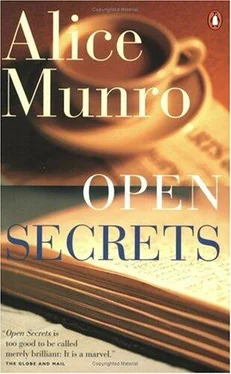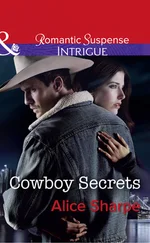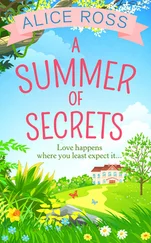He was imitating Bea. He was doing what she was doing but in a sillier, ugly way. He was most intentionally and insistently making a fool of her. See how vain she is, said Ladner’s angular prancing. See what a fake. Pretending not to be afraid of the deep water, pretending to be happy, pretending not to know how we despise her.
This was thrilling and shocking. Liza’s face was trembling with her need to laugh. Part of her wanted to make Ladner stop, to stop at once, before the damage was done, and part of her longed for that very damage, the damage Ladner could do, the ripping open, the final delight of it.
Kenny whooped out loud. He had no sense.
Bea had already seen the change in Liza’s face, and now she heard Kenny. She turned to see what was behind her. But Ladner had dropped into the water again, he was pulling up weeds.
Liza at once kicked up a distracting storm. When Bea didn’t respond to this, she swam out into the deep part of the pond and dived down. Deep, deep, to where it’s dark, where the carp live, in the mud. She stayed down there as long as she could. She swam so far that she got tangled in the weeds near the other bank and came up gasping, only a yard or so away from Ladner.
“I got caught in the reeds,” she said. “I could have drowned.”
“No such luck,” said Ladner. He made a pretend grab at her, to get her between the legs. At the same time he made a pious, shocked face, as if the person in his head was having a fit at what his hand might do.
Liza pretended not to notice. “Where’s Bea?” she said.
Ladner looked at the opposite bank. “Maybe up to the house,” he said. “I didn’t see her go.” He was quite ordinary again, a serious workman, slightly fed up with all their foolishness. Ladner could do that. He could switch from one person to another and make it your fault if you remembered.
Liza swam in a straight line as hard as she could across the pond. She splashed her way out and heavily climbed the bank. She passed the owls and the eagle staring from behind glass. The “Nature does nothing uselessly” sign.
She didn’t see Bea anywhere. Not ahead on the boardwalk over the marsh. Not in the open space under the pine trees. Liza took the path to the back door of the house. In the middle of the path was a beech tree you had to go around, and there were initials carved in the smooth bark. One “L” for Ladner, another for Liza, a “K” for Kenny. A foot or so below were the letters “P.D.P.” When Liza had first shown Bea the initials, Kenny had banged his fist against P.D.P. “Pull down pants!” he shouted, hopping up and down. Ladner gave him a serious pretend-rap on the head. “Proceed down path,” he said, and pointed out the arrow scratched in the bark, curving around the trunk. “Pay no attention to the dirty-minded juveniles,” he said to Bea.
Liza could not bring herself to knock on the door. She was full of guilt and foreboding. It seemed to her that Bea would have to go away. How could she stay after such an insult — how could she put up with any of them? Bea did not understand about Ladner. And how could she? Liza herself couldn’t have described to anybody what he was like. In the secret life she had with him, what was terrible was always funny, badness was mixed up with silliness, you always had to join in with dopey faces and voices and pretending he was a cartoon monster. You couldn’t get out of it, or even want to, any more than you could stop an invasion of pins and needles.
Liza went around the house and out of the shade of the trees. Barefoot, she crossed the hot gravel road. There was her own house sitting in the middle of a cornfield at the end of a short lane. It was a wooden house with the top half painted white and the bottom half a glaring pink, like lipstick. That had been Liza’s father’s idea. Maybe he thought it would perk the place up. Maybe he thought pink would make it look as if it had a woman inside it.
There is a mess in the kitchen — spilled cereal on the floor, puddles of milk souring on the counter. A pile of clothes from the Laundromat overflowing the corner armchair, and the dishcloth — Liza knows this without looking — all wadded up with the garbage in the sink. It is her job to clean all this up, and she had better do it before her father gets home.
She doesn’t worry about it yet. She goes upstairs where it is baking hot under the sloping roof and gets out her little bag of precious things. She keeps this bag stuffed in the toe of an old rubber boot that is too small for her. Nobody knows about it. Certainly not Kenny.
In the bag there is a Barbie-doll evening dress, stolen from a girl Liza used to play with (Liza doesn’t much like the dress anymore, but it has an importance because it was stolen), a blue snap-shut case with her mother’s glasses inside, a painted wooden egg that was her prize for an Easter picture-drawing contest in Grade 2 (with a smaller egg inside it and a still smaller egg inside that). And the one rhinestone earring that she found on the road. For a long time she believed the rhinestones to be diamonds. The design of the earring is complicated and graceful, with teardrop rhinestones dangling from loops and scallops of smaller stones, and when hung from Liza’s ear it almost brushes her shoulders.
She is wearing only her bathing suit, so she has to carry the earring curled up in her palm, a blazing knot. Her head feels swollen with the heat, with leaning over her secret bag, with her resolution. She thinks with longing of the shade under Ladner’s trees, as if that were a black pond.
There is not one tree anywhere near this house, and the only bush is a lilac with curly, brown-edged leaves, by the back steps. Around the house nothing but corn, and at a distance the leaning old barn that Liza and Kenny are forbidden to go into, because it might collapse at any time. No divisions over here, no secret places — everything is bare and simple.
But when you cross the road — as Liza is doing now, trotting on the gravel — when you cross into Ladner’s territory, it’s like coming into a world of different and distinct countries. There is the marsh country, which is deep and jungly, full of botflies and jewelweed and skunk cabbage. A sense there of tropical threats and complications. Then the pine plantation, solemn as a church, with its high boughs and needled carpet, inducing whispering. And the dark rooms under the down-swept branches of the cedars — entirely shaded and secret rooms with a bare earth floor. In different places the sun falls differently and in some places not at all. In some places the air is thick and private, and in other places you feel an energetic breeze. Smells are harsh or enticing. Certain walks impose decorum and certain stones are set a jump apart so that they call out for craziness. Here are the scenes of serious instruction where Ladner taught them how to tell a hickory tree from a butternut and a star from a planet, and places also where they have run and hollered and hung from branches and performed all sorts of rash stunts. And places where Liza thinks there is a bruise on the ground, a tickling and shame in the grass.
P.D.P .
Squeegey-boy .
Rub-a-dub-dub .
When Ladner grabbed Liza and squashed himself against her, she had a sense of danger deep inside him, a mechanical sputtering, as if he would exhaust himself in one jab of light, and nothing would be left of him but black smoke and burnt smells and frazzled wires. Instead, he collapsed heavily, like the pelt of an animal flung loose from its flesh and bones. He lay so heavy and useless that Liza and even Kenny felt for a moment that it was a transgression to look at him. He had to pull his voice out of his groaning innards, to tell them they were bad.
He clucked his tongue faintly and his eyes shone out of ambush, hard and round as the animals’ glass eyes.
Читать дальше












